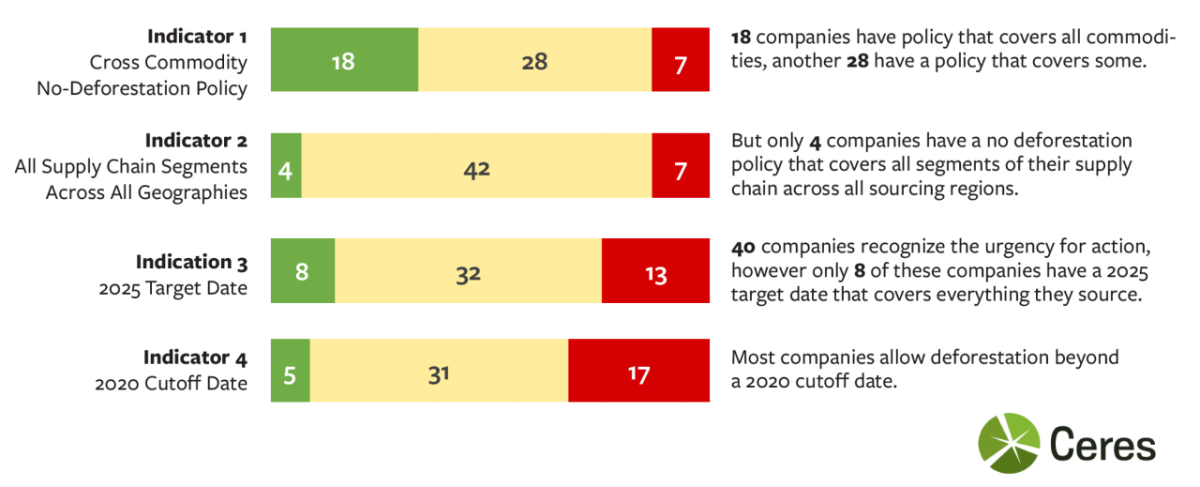Dozens of Major Companies Lack Comprehensive Deforestation Policies, New Ceres Analysis Finds

November 28, 2023 /3BL/ - With escalating risks from the world’s climate and nature crises and enhanced European regulatory risks, Ceres released a new scorecard today that reveals few of the largest global companies are taking ambitious action to tackle commodity-driven deforestation and drive progress toward a net zero economy.
The Ceres’ Deforestation Scorecard: Assessing Corporate Action on Deforestation Amid Growing Regulatory Risk assesses 53 major companies across 15 industries, including adidas AG, Cargill, Restaurant Brands International, and Procter & Gamble Co. These companies face the greatest risks from sourcing deforestation-linked commodities like soy, timber, and palm oil and most of them lack robust no-deforestation policies, despite recognizing the importance of deforestation action.
Robust no-deforestation policies are a critical first step in companies removing deforestation from their supply chains, which the scientific community agrees companies need to do by 2025 to support a 1.5°C future and halting nature and biodiversity loss globally. Investors also are looking for companies to mitigate risks by incorporating comprehensive, time-bound no-deforestation policies in their transition plans. Earlier this year, the Founding Partners of the Investor Agenda added specific deforestation guidance to its Expectations Ladder for Investor Climate Action Plans or ICAPs.
Ceres analysis comes as world leaders are set to convene for the 2023 United Nations Conference of Parties (COP28), where collective progress on ending deforestation by 2030 will be a focus of the international negotiations. In addition, the European Union is implementing new rules for commodities that are linked to deforestation, increasing regulatory risk for any company that operates in the region. The Regulation on Deforestation-free Products (EUDR) compels companies to eliminate deforestation and forest degradation from their EU-bound products starting in 2024. Meanwhile, the Corporate Sustainability Reporting Directive and Corporate Sustainability Due Diligence Directive, which are both still under development, will require corporate disclosure of deforestation impacts and mitigation plans.
“Given the urgency of the dual climate and nature crises and the enhanced regulatory risks, Ceres’ Deforestation Scorecard provides important and timely insights into how much deforestation action is needed from the largest companies across multiple sectors worldwide,” said Meryl Richards, Program Director, Food and Forests at Ceres who authored the report. “If companies lack a comprehensive no-deforestation policy, they will likely not be prepared to comply with existing and emerging regulations nor meet investor expectations on deforestation actions and deliver upon their no-deforestation commitments.”
To determine scores, Ceres conducted a rigorous analysis of publicly available information on each company’s deforestation policy, including company websites and sustainability reports, as well as other corporate disclosures, such as CDP questionnaires. Companies were assessed against four key indicators, all of which align with the Accountability Framework Initiative’s guidance on robust no-deforestation policies.
- Does the company have a multi/cross-commodity no-deforestation policy that covers all relevant commodities (such as soy, beef, palm oil, wood, cocoa, coffee, rubber or derived products) that the company sources?
- Does the company's policy cover all segments of the supply chain across all geographies?
- Does the policy include a time-bound, quantifiable commitment to achieve a deforestation-free supply chain by 2025?
- Does the policy include cutoff targets of 2020 or earlier?
The findings reveal that only 18 of the assessed companies have a policy that covers all the commodities subject to the EUDR, and only four companies (Amaggi, Kering SA, Mondi Group, and Suzano) have a no-deforestation policy that covers all segments and sourcing regions of their supply chain.
While most companies have specified a target date for fully implementing their no-deforestation policies, only eight of these policies are ambitious enough to meet the recommended 2025 no-deforestation target date. And, just a handful of companies include a cutoff date that bans commodities from being produced on land that was deforested after 2020, as the EUDR requires.
“The gaps exposed in Ceres’ Deforestation Scorecard create material risks for companies and their investors, while exacerbating the systemic risks of climate change and nature loss,” added Richards. "As part of transition planning, we need to see companies develop and implement comprehensive, time-bound no-deforestation policies that cover all commodities across all supply chains and sourcing regions which includes ambitious targets and cutoff dates.”
About Ceres
Ceres is a nonprofit organization working with the most influential capital market leaders to solve the world’s greatest sustainability challenges. Through our powerful networks and global collaborations of investors, companies, and nonprofits, we drive action and inspire equitable market-based and policy solutions throughout the economy to build a just and sustainable future. For more information, visit ceres.org and follow @CeresNews.
Media Contact: Bridget Vis, vis@ceres.org

